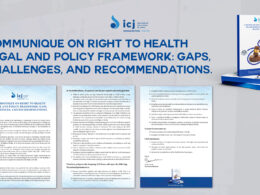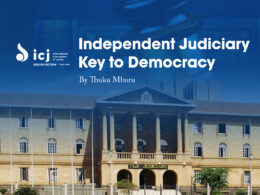By Joanne Mutonga
The death penalty is not about whether people deserve to die for the crimes they commit. The real question of capital punishment in this country is, do we deserve to kill?”
In the first series of ICJ Kenya three-part discussion on death penalty, ICJ Kenya Programme Officer Joanne Mutonga discusses on the abolition of death penalty as a global human rights conversation.
The Death penalty is regarded as an affront to the dignity of a convicted person.[1]The Universal Declaration on Human Rights provides that every human being is born free and equal in dignity and rights.’ Further, Article 5 of the Declaration provides that, ‘No one shall be subjected to torture or to cruel, inhuman or degrading treatment or punishment.’ The International Covenant on Civil and Political Rights provides that every human being has the right to life but equally provides that, “Every human being has the inherent right to life. This right shall be protected by law. No one shall be arbitrarily deprived of his life.
The International Covenant on Civil and Political Rights further provides that, “In countries which have not abolished the death penalty, sentence of death may be imposed only for the most serious crimes in accordance with the law in force at the time of the commission of the crime and not contrary to the provisions of the present Covenant and to the Convention on the Prevention and Punishment of the Crime of Genocide. This penalty can only be carried out pursuant to a final judgement rendered by a competent court. “Whilst the ICCPR makes provision for the death penalty in most serious crimes, it proceeds to provide a caveat to its application providing that, “Nothing in this article shall be invoked to delay or to prevent the abolition of capital punishment by any State Party to the present Covenant.”
The Abolition of the Death Penalty: A Global Movement
Civil Society Organizations have rightfully earned their mark in changing the trajectory of socio-political and legal practices and attitudes to be consistent with existing human rights. One of the landmark rights movement attributable to their contribution is the campaign on the abolition of the death penalty. The campaign on the abolition of the death penalty was founded on the legal precept that the death penalty is a breach to human rights in particular, the right to life and the right to live free from torture or cruel, inhuman or degrading treatment or punishment.[2] The campaign has since mutated into a global movement involving civil society organizations drawn from across the world. These organizations have been the forerunners of the abolitionist campaign urging states to make commitments to support the cause.
In 2002, the World Coalition Against the Death Penalty, an alliance of more than 160 NGOs, was created in Rome as a result of the commitment made by the signatories of the Final Declaration of the 1st World Congress Against the Death Penalty organized by the French NGO Together Against the Death Penalty (ECPM) in Strasbourg in June 2001.[3]
In 1977 only 18 Countries had abolished the death penalty. As of February 2019, the Death Penalty Information Center (DPIC), had recorded 106 states as having fully abolished the death penalty for all crimes. This included a number of states that are abolitionist in practice or for ‘ordinary crimes’ only, therefore bringing the total number of abolitionist states to 142. [4]
The abolitionist campaign also saw the development and adoption of normative instruments providing frameworks within which States may be held accountable for their commitments. This include: (i) The Second Optional Protocol to the International Covenant on Civil and Political Rights, aiming at the abolition of the death penalty (ii) The Protocol No. 6 to the European Convention on Human Rights, concerning the abolition of the death penalty, and (iii) Protocol No. 13 to the European Convention on Human Rights, concerning the abolition of the death penalty in all circumstances.[5]
-THE END-
[1] Bryan Stevenson, Just Mercy: A Story of Justice and Redemption
[2] Ibid.2
[3] https: //world coalition against the death penalty
[4] https.//deathpenaltyinfo.org
[5] Ibid 3










